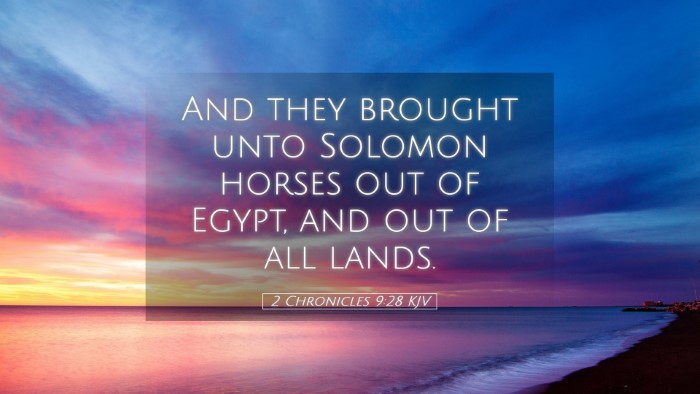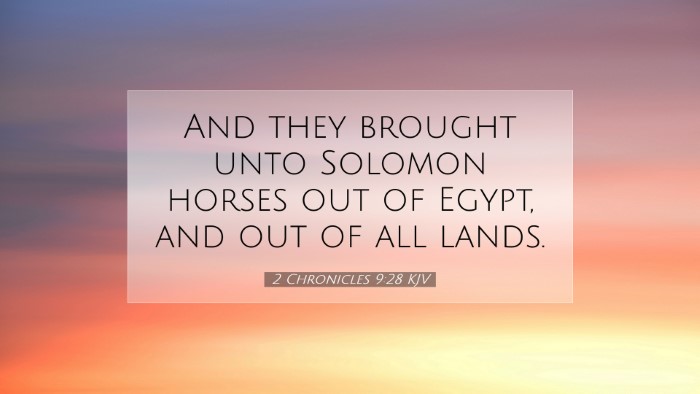Commentary on 2 Chronicles 9:28
Verse: "And they brought unto him horses out of Egypt, and out of all lands." (2 Chronicles 9:28)
Introduction
The verse in 2 Chronicles 9:28 succinctly captures a significant facet of King Solomon’s reign—his extensive trade networks and the wealth that characterized his rule. This commentary aims to delve into the theological and historical significance of this passage, drawing upon the insights of renowned biblical commentators such as Matthew Henry, Albert Barnes, and Adam Clarke.
Historical Context
The events chronicled in 2 Chronicles revolve around the reign of Solomon, who is famed for his wisdom, wealth, and monumental building projects, including the Temple in Jerusalem. By this time, Israel had reached a zenith of economic prosperity, facilitated by Solomon’s diplomatic marriages and alliances, which influenced trade dynamics in the region.
Trade with Egypt and Beyond
Horses, particularly from Egypt, were highly valued in the ancient world. Their importation signifies Solomon's expanding military and trade power. Ancient records highlight how Egyptian horses were renowned for their quality, which would enhance the prestige of Solomon’s kingdom.
Significance of Horses
Horses were not merely a symbol of military strength but also represented royal wealth and status. Solomon’s procurement of these animals through trade reflects his ambition and the political landscape of his time. According to Matthew Henry, this illustrates not only the material wealth but also the strategic savvy of Solomon in utilizing favorable trade routes and partnerships.
Theological Insights
The gathering of horses from various lands speaks to God's providential support of Solomon. This was part of the fulfillment of God's promises to Israel concerning their kingship and prosperity. As indicated by Albert Barnes, the extensive wealth and resources at Solomon’s disposal serve as a testament to the favor of God upon Israel during this epoch.
Divine Favor and Judgment
However, one must also recognize the dual nature of divine favors. While God provided Solomon with wisdom, wealth, and resources, Solomon’s eventual lapse into idolatry and preference for foreign alliances raises critical discussions about the consequences of wealth and ease. Adam Clarke notes that while God blesses those who serve Him, reliance on material wealth can lead to spiritual decline.
Lessons for Believers
From 2 Chronicles 9:28, modern Christians can glean various lessons pertinent to faith, stewardship, and the pursuit of wisdom:
- Wisdom in Leadership: Solomon’s wisdom is highlighted not just in his decisions but also in his administrative actions, emphasizing the need for discernment in leadership.
- Value of Resources: The acknowledgment of material wealth as a blessing must be tempered with the understanding of stewardship—resources should be employed for God’s glory.
- Vigilance Against Idolatry: Solomon’s riches led him to distractions, thus calling believers to remain vigilant against the lure of materialism that can lead one away from God.
- Divine Providence: Recognizing God's hand in the provision of resources encourages faith in God’s ongoing support and blessing in the life of the believer.
Conclusion
The brief account provided in 2 Chronicles 9:28 gestures towards a rich tapestry of historical and theological themes. The verse encapsulates both the glory of the reign of Solomon and sets the stage for an important cautionary tale about the perils of turning away from God in the face of prosperity. Drawing from the wisdom of past commentators, believers today are invited to reflect on the balance of seeking divine wisdom and managing the worldly wealth entrusted to them.


